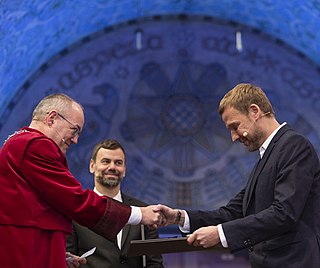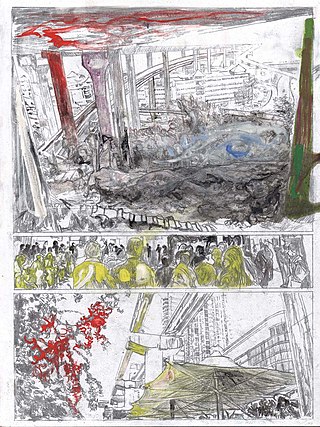Related Research Articles
Anya Gallaccio is a British artist, who creates site-specific, minimalist installations and often works with organic matter.

Angela Bulloch, is an artist who often works with sound and installation; she is recognised as one of the Young British Artists. Bulloch lives and works in Berlin.

Andreas Gursky is a German photographer and professor at the Kunstakademie Düsseldorf, Germany.
Hans Josephsohn was a Swiss sculptor who lived and worked in Zurich.
Thomas Scheibitz is a German painter and sculptor. Together with Tino Sehgal he created the German pavilion on the 51st Venice Biennale in 2005. He lives and works in Berlin.

Norbert Bisky is a German artist based in Berlin. He is one of the most important representatives of a new figurative painting in the 21st century.
Michael Buthe was a German artist who lived and worked between Germany and Morocco. He exhibited widely throughout Europe during his life and is known for his eclectic and prolific oeuvre which encompasses painting, sculpture, and installation.

Franz Gertsch was a Swiss painter who was known for his large format hyperrealistic portraits.
Caro Niederer is a contemporary artist who lives and works in Zürich.

Michael Elmgreen and Ingar Dragset have worked together as an artist duo since 1995. Their work explores the relationship between art, architecture and design.
Helmut Federle is a Swiss painter.
Qiu Shihua is a Chinese landscape painter. He lives and works in Beijing and Shenzhen.
A K Dolven is a Norwegian artist. She works across painting, film, sound, sculpture and interventions in public space.

Nanne Meyer, is a German artist. She is one of the first women artists of the postwar generation who works primarily in drawing. Meyer lives and works in Berlin.

Stefan Ettlinger is a German painter and draughtsman. He studied at the Kunstakademie Düsseldorf at Alfonso Hüppi as a master student. He lives and works in Düsseldorf.

Rita McBride is an American artist and sculptor. She is based in Los Angeles and Düsseldorf. Alongside her artistic practice, McBride is a professor at the Kunstakademie Düsseldorf, and served as its director until 2017. McBride is married to Glen Rubsamen, an American painter from Los Angeles.
Norbert Prangenberg was an abstract painter, sculptor, and engraver who was born in Nettseheim, just outside of Cologne, Germany. Though he had no formal training and did not fully engage with art until his 30s, Prangenberg did finally come up with a style that was uniquely his own, not fitting comfortably into the neo-expressionist or neo-geo movements of his time, in the 1970s and 1980s. At this time, he was considered a major figure in contemporary German art. Though he got his start with abstract paintings, he also became known for making sculptures of all sizes; and while his work initially appears abstract, the titles given sometimes allude to the human body or a landscape. As a trained gold- and silversmith, as well as a glassblower, he always showed an attention to materials and how they could be physically engaged with. He was interested in how his own two hands could affect the painting or sculpture's surface. Traces of the artist's hand appear literally throughout his entire oeuvre, before he lost the battle with liver cancer in 2012.

Wiebke Siem is a German mixed media artist of German and Polish heritage, winner of the prestigious Goslarer Kaiserring in 2014 as "one of the most innovative and original artists who has never compromised in their art and whose sculptures have a tremendous aura and presence because they mix the familiar and the unfamiliar, the known and the unknown".
Maria Eichhorn is a German artist based in Berlin. She is best known for site-specific works and installations that investigate political and economic systems, often revealing their intrinsic absurdity or the extent to which we normalize their complex codes and networks. She represented Germany at the 2022 Venice Biennale.
Reinhard Voigt is a German painter and ceramist.
References
- 1 2 3 Sherwin, Skye (2 March 2011). "Artist of the week 128: Bethan Huws". The Guardian. Retrieved 9 April 2018.
- 1 2 3 Summers, Francis (2000). "Huws, Bethan". Grove Art Online. Oxford University Press. Retrieved 9 April 2018.
- 1 2 3 4 5 "Bethan Huws at Galleria Vistamare, Pescara •". Mousse Magazine. 11 May 2014. Retrieved 2 April 2021.
- 1 2 Wiehager, Renate (2016). Bethan Huws: Choice and Precision, Coincidence and Difference. Berlin: Daimler Contemporary Berlin.
- 1 2 3 4 "Bethan Huws Artist Biography". www.artland.com. Retrieved 2 April 2021.
- 1 2 3 4 "Bethan Huws | Frieze". Frieze. Retrieved 2 April 2021.
- ↑ ArtFacts. "Bethan Huws". ArtFacts. Retrieved 2 April 2021.
- ↑ "ARTS COUNCIL OF WALES ANNOUNCES ARTISTS FOR VENICE BIENNALE 2003" (Press release). Arts Council of Wales. 14 January 2003. Archived from the original on 13 October 2006.
- "Further: Artists from Wales at the 50th International Art Exhibition, Venice". Archived from the original on 27 September 2007.
- "Bethan Huws". Ingleby Gallery. Retrieved 9 April 2018. - 1 2 "'Singing for the Sea', Bethan Huws, 1993". Tate. Retrieved 9 April 2018.
- 1 2 3 4 5 6 7 8 9 10 11 12 13 14 15 16 17 18 19 20 21 22 23 24 25 26 27 28 29 30 31 32 33 34 35 36 37 38 39 40 41 42 43 44 45 46 47 48 49 50 51 52 53 54 55 56 57 58 59 60 61 62 63 64 65 66 67 68 69 70 71 72 73 74 75 76 77 78 79 80 81 82 83 84 85 86 87 88 89 90 91 92 93 94 95 96 97 98 99 100 101 102 103 104 105 106 107 108 "Bethan Huws". Artnet. Retrieved 2 April 2021.
- 1 2 "Bethan Huws, Welsh, b. 1961". Artsy. Retrieved 3 April 2021.
- 1 2 "Hans Rudolf Reust on Bethan Huws". Artforum. Retrieved 3 April 2021.
- 1 2 3 4 5 6 7 8 9 10 11 12 13 14 15 16 17 18 19 20 21 22 23 24 25 26 27 28 29 30 31 32 33 34 35 36 37 38 39 40 41 42 "Bethan Huws, British 1961". Mutual Art. Retrieved 8 April 2021.